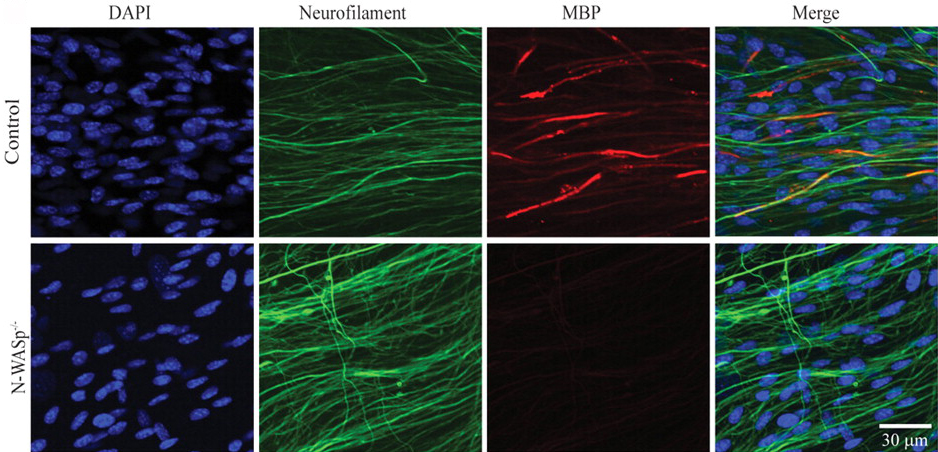Schwann cells and N-WASp: it always comes down to actin
Posted by Erin M Campbell, on 22 April 2011
Axons have such important jobs to do that they require their own support staff. Schwann cells are responsible for ensheathing axons of the peripheral nervous system with myelin, which allows rapid conduction of action potentials. The process by which Schwann cells do this was understood to involve cytoskeletal regulators, and a recent paper in Development describes how N-WASp plays a role.
Schwann cells begin the myelination process by spiraling lamellipodia-like processes around an axon. Actin is known to be important for Schwann cell myelination, yet an understanding of the actin effectors involved is incomplete. In a recent paper, Jin and colleagues demonstrate the role of N-WASp, a protein that links extracellular signals with actin polymerization, in Schwann cell maturation and myelination. Schwann cells in N-WASp deletion mutants were unable to extend lamellipodia-like processes normally, which likely contributes to the myelination problems also seen in these mutants. Although these mutant mice were viable through old age, they did display some motor defects. Images above show axons in normal (top) and N-WASp mutants (bottom). Without N-WASp, axons (green) remain without myelin, as seen as low levels of the myelin basic protein (MBP, red).
![]() Jin, F., Dong, B., Georgiou, J., Jiang, Q., Zhang, J., Bharioke, A., Qiu, F., Lommel, S., Feltri, M., Wrabetz, L., Roder, J., Eyer, J., Chen, X., Peterson, A., & Siminovitch, K. (2011). N-WASp is required for Schwann cell cytoskeletal dynamics, normal myelin gene expression and peripheral nerve myelination Development, 138 (7), 1329-1337 DOI: 10.1242/dev.058677
Jin, F., Dong, B., Georgiou, J., Jiang, Q., Zhang, J., Bharioke, A., Qiu, F., Lommel, S., Feltri, M., Wrabetz, L., Roder, J., Eyer, J., Chen, X., Peterson, A., & Siminovitch, K. (2011). N-WASp is required for Schwann cell cytoskeletal dynamics, normal myelin gene expression and peripheral nerve myelination Development, 138 (7), 1329-1337 DOI: 10.1242/dev.058677



 (1 votes)
(1 votes)